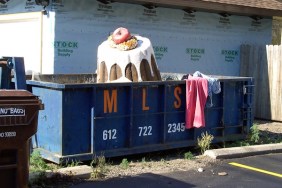Ultra-portable and long-lasting, shipping containers are ideal building blocks for prefabricated eco-friendly architecture. From emergency shelters in disaster areas to massive urban projects, these steel crates represent endless possibilities and are present in huge quantities in port cities all over the world. The following three recent examples of shipping container reuse show just how versatile they are, including a traveling pop-up restaurant and a boy scout camp.
Greenhouse by Joost is a traveling eco-exhibit and restaurant conceived by artist Joost Bakker, and it aims to be as environmentally friendly as possible, made from shipping containers and straw bales and even growing some of its own food on the rooftop. There’s no trash – everything is recycled or composted – and used cooking oil powers the generator. Currently in Sydney, the restaurant will be heading to Milan this month for the International Furniture Fair before moving on to other cities.
Airy, modern and colorful, this San Antonio shipping container house by Poteet Architects was constructed for use as a summer house, entertainment and guest quarters in an artist community. The owner selected this container specifically for its stunning blue color. Mounted on recycled telephone poles and lined with bamboo, the tiny guest house also features a cantilevered porch platform and a green roof full of flowers.
Heavily critiqued by Treehugger, this forward-thinking new concept for Boy Scout cabins is nonetheless an interesting shift from the old wooden-platform-and-tent of yore. Architect Richard Hammond from Gensler in Los Angeles constructed the prototype for the sustainable renovation of a camp on Catalina Island from a reclaimed shipping container with a fabric top for insulation and that all-important connection to the outdoors. The camp’s director wanted to go in a new green direction for eco-educational purposes, connecting ecologically sound accommodations that protect the wilderness to the scouts’ “leave no trace” philosophy.







